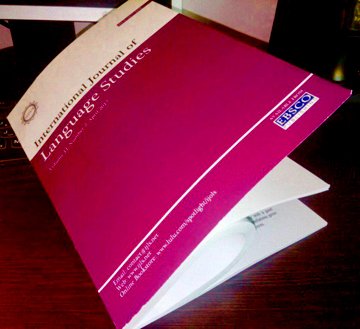International Journal of Language Studies
A Quarterly Journal of Applied Linguistics
ISSN: 2157-4898 | eISSN: 2157-4901
Sherpa/RoMEO Color: Yellow
Editor: Mohammad A. Salmani Nodoushan
Guest Editors
Please be sure to read our Special Issue Protocol before you propose any special issues.
Guest editors do play a very important role in acquiring content and leading the review process for special issue publications. Applied linguists who are interested in editing a special issue of IJLS can become a guest editor in two ways:
- The journal may invite them as an expert in their specific field of research.
- They can submit a proposal for a special issue; the editor-in-chief will approve or reject it after consulting with the editorial board.
Special Issues
By default, a special issue is normally supposed to focus on a specific area of research that has a broad appeal and falls within the aims and the scopes of the journal. It also provides an excellent opportunity to:
- Review a particular theme
- Examine previously unaddressed aspects
- Propose and develop new approaches
- Exchange perspectives
- Encourage new lines of research
The key benefits of a special issue include:
- Increased distribution to wider audience
- Additional content for subscribers
- Available in print or electronic format
- Increased citations
Duties of Guest Editors
The guest editor is responsible for ensuring that the peer-review process is fair and timely. This selection of papers should be based on the scientific quality of the content and the topic should clearly fall within the scope of the special issue of the journal.
- The guest editor is expected to select reviewers who have suitable expertise in the field and must review all disclosures of potential conflicts of interest made by reviewers in order to determine whether there is any potential for bias.
- Research articles must typically be reviewed by at least two external and independent reviewers, and where necessary the guest editor should seek additional opinion. The guest editor must follow the best review practice and avoid the selection of fraudulent peer reviewers.
- The guest editor should protect the confidentiality of all material submitted to the journal and all communications with reviewers; the guest editor must protect reviewers’ identities.
- The guest editor should follow IJLS policy relating to the disclosure of conflicts of interest by authors and reviewers.
- The special issue may publish submissions from the guest editor but the number should be kept to the minimum necessary. The guest editor must not be involved in decisions about papers in which s/he has written him/herself. Peer review of any such submission should be handled independently of the relevant guest editor/co-editor and their research groups, and there should be a clear statement to this effect on any such paper that is published.
- IJLS code of conduct, Peer-Review Policy, Peer-Review Process, Author Guidelines, etc. must be followed in all special issues.
BACK TO TOP
Copyright © International Journal of Language Studies 2007 - All Rights Reserved
Template by OS Templates

